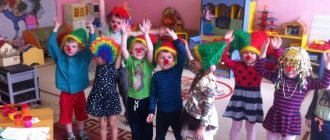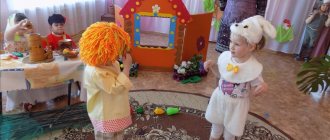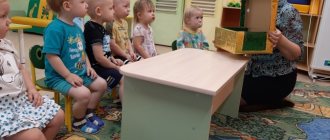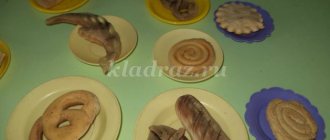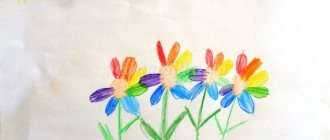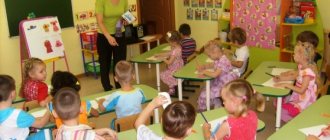Summary of educational activities for theatrical activities in the middle group “Playing theatre”
.Summary of GCD for theatrical activities
in the middle group
"We're playing theater"
Target
: development of creative abilities through theatrical activities
Tasks
: 1. Teach children to clearly pronounce the text using different emotional colors (joy, sadness);
2. Develop children’s psychophysical abilities (facial expressions, gestures); 3. Cultivate cognitive interest in theatrical activities; 4. Encourage children to actively participate in theatrical games. Progress:
(The storyteller enters)
Storyteller:
Guys, do you recognize me?
Children:
You are a storyteller.
Storyteller:
Do you know where fairy tales are shown?
Children:
In the cinema, on TV.
Storyteller:
And fairy tales are also shown in the theater. Do you know who shows fairy tales in the theater?
Children:
Artists.
Storyteller:
Guys, do you want to become artists?
(Children's answers). Storyteller:
Let's play artists.
Do you know that an artist is helped by his face, eyes, hands. Today you and I will learn to convey through facial expressions and body movements what we feel. After all, these skills help us better convey the images of our heroes when we stage a fairy tale. Let's start our lesson with a warm-up game called "Transfers".
Be careful and follow my instructions clearly.
First I will explain to you the rules of this game. We convey everything to each other silently, and what we feel will be expressed with our eyes, face, lips, shoulders, hands - in general, this is all called facial expressions and gestures.
Sit comfortably and correctly, let's start with... and end with me.
1. Give a smile to your neighbor
(round);
2. Pass the “angry look”
(angry facial expression);
3. Convey “fear”;
4.
Pass on the “horror story.” Storyteller:
And here is the next task -
pass the “clap”.
Let's start with me, I show you transmit to each other.
(First I show one clap; three clap; two clap and a third on the knees). Storyteller:
So, our
warm-up
is over.
Guys, we conveyed everything silently only with facial expressions, i.e., facial expressions,
and movements, i.e.,
gestures
.
Guys, what did we convey? (Gestures, facial expressions, movements). Now let's try to convey our mood with our voice
: happy and sad.
Listen to this phrase: “We’re going, we’re going, to see grandma and grandpa.”
Let's repeat this phrase all together.
(Choral repetition). Storyteller:
Guys, I have drawing cards with facial expressions
of a man: happy and sad.
You need to go to the table and take a little man with a facial expression that you like.
(Children come to the table and take cards). Storyteller:
Now say this phrase:
“We’re going, going, to grandma and grandpa,”
with the intonation of the little man shown in your picture: sad or cheerful.
Here Misha, Sophia, Styopa have a sad little man. Let's try to say this phrase sadly, imagine that someone offended you. (Children take turns saying sad). Storyteller:
And Tanya, Zarina, Arseny are a cheerful little man.
Let's try to say this phrase cheerfully. Imagine that they bought you your favorite toy and you are in a joyful, cheerful mood. (Children take turns saying cheerfully). Storyteller:
Guys, a kitten came to visit me. What fairy tales and cartoons does a kitten live in? (Children's answers).
Storyteller:
Let's stand in a circle and play with him.
Look, I have a little kitten in my hands. I will give each of you to hold him, and you stroke him, caress him, just be careful and tell him kind words. (Children pass to each other and say kind words to the kitten). Storyteller:
Well done!
Guys, I know a poem about “Pussy.”
Do you want to listen to it?
Storyteller:
Listen and say sadly or cheerfully I read this poem. (I read the poem with expression). - Hello pussy, how are you?
Why did you leave us?
- I can’t live with you,
There is nowhere to put the tail.
Walk, yawn,
You step on the tail.
Educator: Funny poem? (Yes) . Educator: How did I read the poem: sad or happy? (Children's answers).
Storyteller:
I read it with intonation and expression.
Guys, let's read this poem to make you feel sorry for the pussy, to make you feel sad. Storyteller:
Who wants to read this sad poem
?
(2-3 children).
Storyteller:
Now let's read it
fun.
And I feel sorry for the pussy and at the same time the poem is funny.
(I read it fun. Then 2-3 children). Storyteller:
Guys, do you want to become pussies yourself who wants to steal a sausage?
(Yes). Storyteller:
Let's try to play
tricky pussy.
Get up from your chairs.
Imagine that you are a pussy who wants to pull a sausage off the table. Stand up like a pussy on your paws. Pussy goes to the kitchen. You spin around the table, rub your back against its leg, stand on your hind legs and inhale the pleasant smell with pleasure. But then the hostess came out of the kitchen. You reach for the sausage with your paw, and there it is in your paws. But then the hostess comes in. Pussy throws the sausage and runs away. Storyteller:
Guys, do you feel sorry for the pussy?
(Yes) . Storyteller:
Let's take pity on her.
Imagine that your left hand is a cat, and with your right hand you are stroking it: - Pussy, kitty, kitty! - Julia called the kitten. - Don’t rush, wait, wait! - And stroked it with her hand!
(L.P. Savina).
Storyteller:
Kitty has calmed down.
Guys, how do you think Mistress Julia will feed her pussy? (Yes) . Storyteller:
What?
(Children's answers) Storyteller:
Well done! I also think that the mistress will stroke her pussy and feed her. Well, it's time for us to say goodbye. Goodbye, guys!
Preparation and conduct of classes in preschool educational institutions
Theatrical activities in the middle group of preschool educational institutions are an exciting process for children. To attract the child's interest in this activity, you need to come up with a fun game. For example, a teacher brings with him a beautiful chest that was found on the way to kindergarten. This chest contains fairy tale characters. In order for the item to open, the guys must guess the riddle.
Mathematical classes in secondary groups of kindergartens
Another scenario is choosing a fun outfit. To interest children in theatrical activities, the teacher can choose the outfit of a grandmother-storyteller (Malanya or Arina). The teacher invites preschoolers to play with her.
Lesson plan
To conduct the lesson, a special long-term plan is drawn up. The idea of different types of theater is consolidated. Techniques for working with finger theater are also reinforced. The director's approach is an examination of interesting games “The Hare Had a Garden”, “Farewell to Winter”, “Meeting Spring”, during which preschoolers develop an interest in the performing arts.
Lesson planning
Important! This helps to develop goodwill and communication skills in relationships with each other.
In addition, the teacher conducts a conversation with the children while reading a fairy tale. This stimulates emotional perception. Thus, the vocabulary is replenished. Preschoolers learn to find expressive means in facial expressions.
Stage attributes
Before conducting a lesson, the teacher must prepare stage attributes (accessories, hats, scenery), such as dolls, theatrical costumes, and makeup.
Applying Stage Attributes
Example scripts
The teacher tries on the image of a storyteller who conducts a fascinating conversation with children. The children are invited to impersonate the images of the artists - learn to convey feelings through facial expressions and gestures.
Example scripts
A special theatrical project is being created in a playful form. Children must convey specific emotions to each other. The next task is to pass a certain number of claps in a circle. You need to pronounce the phrase “Let's go, let's go to the forest for nuts.”
The storyteller tells the preschoolers that a kitten has come to visit them. Children remember cartoons and fairy tales in which this hero is present, and then pass the toy kitten to each other.
The teacher reads the poem by B. Zakhoder “Kiskino Grief” or K.I. Chukovsky “Aibolit”.
An open lesson with children on GCD - a conversation is held on the content. Some children tell it sadly, others cheerfully.
The teacher invites the children to turn into a kitten who wants to steal sausages. You need to get up from the chair, like a pussy, on your hind legs, spin around the table, inhale the fragrant smell of sausages. But then the owner comes in and the kitten runs away.
Reading a poem by L. P. Savina:
“Pussy, pussy, pussy!
Julia called the kitten.
Don't rush, wait, wait!
And she stroked it with her hand.”
The children are asked to imagine how they are stroking a cat with their hand.
It's time for the storyteller to return home. She asks the guys what they liked most about the lesson, what interesting things they learned.
Card index of theatrical games
According to experts, the “Theatrical Games for Children” card file contributes to the development of attention, endurance, and coordination of actions. The following theatrical children's games in the middle group can be distinguished:
Card index
"Hands-legs"
The main goal is to develop active attention and reaction speed.
With one clap, the guys should raise their hands, with two clap, they should immediately stand up. If your hands are raised: one at a time, lower your hands; two at a time, sit down.
"A fun game with chairs"
During the course of work, the kindergarten teacher instills the ability to move freely in space. Coordination of actions is very important here. Children must learn to sit gracefully on chairs, build given figures, etc.
Learning to memorize and retell for the development of auditory memory
Note! At the teacher’s command, the children must carefully move around the hall with their chairs and “build” a circle (sun), a house for a doll, an airplane, a bus.
"What do you hear"
This lesson provides auditory attention training. The guys should sit next to each other and listen to the sounds.
Exercise with objects
This lesson is aimed at training visual attention. The teacher lays out several objects on the table. Among them you can find:
- pencil;
- notebook;
- watch;
- matches;
- coin
The child driving should turn away at this time. The teacher suggests going to the table to look at the object and remember its shape, color, location. After which the child must turn away again, and the teacher, meanwhile, removes one of the presented objects. The preschooler must guess which item is missing.
"Pass the Pose"
By completing this task, children develop qualities such as memory, attention, observation, imagination, and endurance. The teacher sits the children on chairs, creating a semicircle. At the teacher’s command, the children must close their eyes. The driving child must independently come up with and fix a certain pose, showing it to the first peer. Accordingly, the friend must remember and show it to the other child. Therefore, there is a comparison of the poses of the last player with the pose of the driver.
"Remember the photo"
The main goal of this exercise is to develop voluntary attention, imagination and fantasy. The guys must perform all actions in a coordinated manner.
Note! Before starting the task, the teacher divides the preschoolers into several groups, each consisting of 4-5 people. Children must choose one photographer themselves. He must arrange his group in a certain order and make cards.
While doing the work, the child must remember the location of the group. The teacher asks the “photographer” to turn in the other direction. The guys immediately change positions and take other poses. The “photographer” must reproduce the original version.
Middle group. Junior preschool age. Children 4 - 5 years old
Game-activity “In the circus arena” as part of theater week for the middle group
Summary of a game-lesson to get acquainted with the outside world in the middle group "Romashka"
"In the Circus Arena"
Educator: Glebova Daria Sergeevna A game-lesson to get acquainted with the outside world as part of
the theater week in the middle group of the kindergarten "In the Circus Arena"
was developed on ...
Lesson on speech development “Forest kindergarten” using theatrical and gaming technology in the middle group Lesson on speech development “Forest kindergarten”
using technology:
“ Theatrical and gaming technology ” (Middle group)
Goal: introducing children to the art
of theater Objectives : - educational: - learn to act out simple performances, get into character; -learn to use for...
Open theatrical lesson in the middle group
Summary of a lesson in theatrical activities in the middle group “Playing theatre.” During the lesson, the teacher must discover the talent of each child, develop their creative abilities through theatrical activities. Children in the middle group must learn to correctly pronounce the text, expressing their emotions. To perform the work, special equipment is prepared:
- cards-drawings with a person’s facial expression;
- kitten toy;
- laptop;
- recording music.
